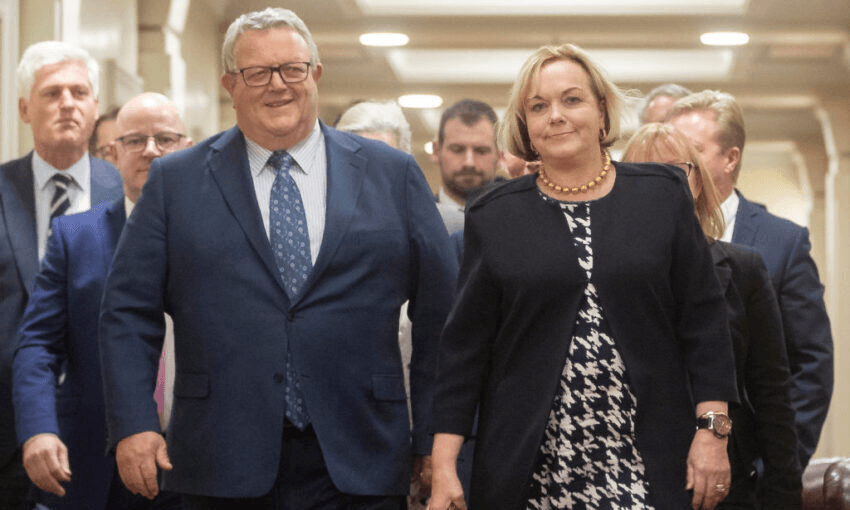A party in crisis has chosen a leader with experience and profile. The challenge is daunting, writes Justin Giovannetti from parliament.
The National Party has turned in its moment of crisis towards a battle-hardened and pugnacious leader in Judith Collins to guide it towards an election that is only 66 days away.
Todd Muller’s unexpected resignation on Tuesday morning upended the largest party in parliament and ended the shortest leadership in National’s history. Facing a void at the top, the party’s caucus rallied around one of their most recognisable figures and elected Collins in an emergency meeting.
Minutes after her selection as leader last night, with the clock ticking towards 10pm, Collins pledged to throw herself into a full-throated opposition of prime minister Jacinda Ardern.
Muller had begun his short tenure by promising not to oppose the Labour-led government for the sake of creating opposition. He often failed at that goal. Where Muller pledged to show courtesy to Ardern in the midst of a pandemic, Collins has made it clear she will not tiptoe around the need to appear kind.
“There is no chance at all that I’m going to let Prime Minister Jacinda Ardern get away with any nonsense when it comes to the economy or doing her job,” Collins told reporters from the ornate legislative chamber.
This was Collins’ third attempt for the National leadership. An ambitious politician, she’d previously lost to Bill English and Simon Bridges. Last night she said she was happy to finally secure the leadership of the party she’d joined decades ago, but warned she wasn’t done. “Leader of the opposition isn’t the prize, we know what the prize is,” she said.
The new National leader signalled an immediate change of tone. She made it clear that she is determined to take the fight to Ardern. You can expect fireworks during the campaign. In a 20-minute exchange with the media, she twice vowed to “take back the country from the current lot”.
She didn’t shy away from the nickname “Crusher Collins” – a moniker she was given, and has at times disavowed, after she pledged to crush the cars of boy racers. With a smile, she said she hopes to lead National to crushing the government.
Collins now has to unite a party that has been publicly divided in recent weeks – a party which now has its third leader in less than two months. To end the leaks and missteps, she said National will focus on “getting rid of the current government”.
Where Muller had been a serious leader, who looked to answer questions forthrightly but struggled when facing unruly MPs and difficult questions from reporters, Collins approached her first press conference with an easy demeanour and a mischievous wink.
Her new deputy is Gerry Brownlee, a member of the party’s old guard. Together the two have 42 years of experience in parliament and many of the most senior roles in the governments of John Key and Bill English. The two delivered the same message Muller had been trying to run on: National is the party of competence and experience.
Party members disheartened by the recent shambles that saw a National MP leak the private health information of individuals of Covid-19 will need to be convinced to return. National is still considerably behind Labour in the polls and Ardern remains one of the most popular leaders in the country’s modern history.
Last night Collins said she’ll be reaching out to members who have been “discombobulated” recently. “They need to know we’re back on track to take the fight to the government. I can’t wait to do that,” she said.
When asked how she differs from a prime minister who has faced a natural disaster, terror attack, global pandemic and economic meltdown, Collins said she brings more “experience, toughness and the ability to make decisions” than Ardern.
Where Muller often had trouble with the message of competence, with his inexperience showing as the party was thrown into chaos during his 53 days as leader, Collins and Brownlee have a much deeper well of experience.
Some of that history has also seen both of the party’s two new leaders face scorn and criticism. Collins had to quit Key’s cabinet at his insistence, only to return later – an episode she documents bitterly in her recently published memoir. As ministerial head of the Christchurch rebuilding, Brownlee still faces anger in the city for some of his harsh criticism of residents unhappy with the government’s construction programme.
Collins and Brownlee will also have a different relationship with NZ First leader Winston Peters. Where Muller nudged the door open to working with Peters, Collins said she hopes the New Zealand First leader comes to her after the September election.
Brownlee and Peters also have a unique relationship in the house. The two men are from the same era of politics. The deputy prime minister has a habit of calling Brownlee a “woodwork teacher from Christchurch” and routinely makes jokes about the size of the now deputy leader of National. Brownlee tends to respond with a wise crack of his own.
A full rebuilding of the party’s front bench is unlikely, said Collins. Even health spokesperson Michael Woodhouse, who became embroiled in a controversy last week around leaked health data, looks safe.
It’s unclear how she’ll deal with the problems that bedevilled her predecessor. Where Muller struggled with questions about the lack of non-white representation in his front bench, Collins snapped in late May: “Is there something wrong with me being white?”
This morning, the prime minister returns after a pre-campaign break. She is making a speech about the Covid-19 recovery, and will be looking to remind New Zealanders of her authority and credibility in the face of that crisis. It will very likely deliver for Collins a sharp reminder of the gravity of the challenge she faces.

